Lacenaire, the Elegant Criminal
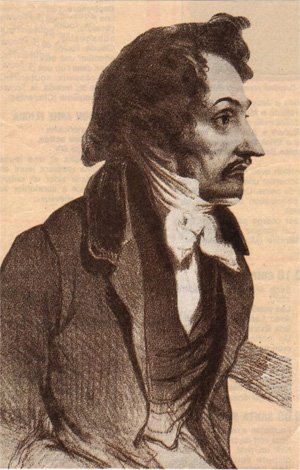 The French philosopher Simone Weil wrote in 1943: “Imaginary evil is romantic and varied; real evil is gloomy, monotonous, barren, boring.” In writing this, she was speaking as one of those who had fled the approaching Nazi forces, against the previous French literary tradition. For the last century it had portrayed dashing exciting criminals, pitted against policemen who were either boring flat cardboard cutouts, or little better than criminals themselves. But the inspiration for that imaginary evil came from one real man, who spent his life searching for what he was going to be until he decided one day to be evil. He had faded from public consciousness, but then been brought back to the forefront in 1945 by his appearance as a character in the recently released Children of Paradise, considered by many to be the finest French film of all time. He was the man they called the Elegant Criminal, Lacenaire.
The French philosopher Simone Weil wrote in 1943: “Imaginary evil is romantic and varied; real evil is gloomy, monotonous, barren, boring.” In writing this, she was speaking as one of those who had fled the approaching Nazi forces, against the previous French literary tradition. For the last century it had portrayed dashing exciting criminals, pitted against policemen who were either boring flat cardboard cutouts, or little better than criminals themselves. But the inspiration for that imaginary evil came from one real man, who spent his life searching for what he was going to be until he decided one day to be evil. He had faded from public consciousness, but then been brought back to the forefront in 1945 by his appearance as a character in the recently released Children of Paradise, considered by many to be the finest French film of all time. He was the man they called the Elegant Criminal, Lacenaire.
Lacenaire was born as Pierre François Gaillard in Lyon in 1803, the second surviving son of an elderly rich man and his much younger wife. Lacenaire aways hated his father, and maintained that his elder brother was the favourite, with himself passed over. He spent his childhood moving from school to school, often expelled either for insolence or (on one occasion) for claiming he was going to convert to Protestantism, which outraged his father. The latter saw him dispatched to a Jesuit seminary, where he actually seems to have done quite well, until it closed down, and he moved on once again. By the age of 17 he was well educated but had no formal qualifications, a fact which caused a major falling out with his parents. His father had intended him to be a doctor or lawyer, but he could not finance the extended study Lacenaire would need, as his own business was failing as well. Instead Lacenaire spent several years working office jobs in Lyon, before moving to Paris in 1824. He lived with an aunt and tried to succeed as a writer, but the lack of instant success disillusioned him. Instead he joined a Swiss regiment of the French army under a false name, but deserted when he found military life no more agreeable. Instead he drifted through a variety of jobs, the most respectable of which seems to have been a liquor salesman. Most of his money seems to have come from cadging off his wealthier relatives, and most of that he spent on gambling. He began to work as a conman at this point, and it was either a con gone wrong or a gambling debt that sent him looking for help from the one person he would have hated asking – his father. His debt was settled, but he was forced to enrol in the army again, this time under his real name. He participated in French military operations in Greece and due to his office experience was made quartermaster, a promotion which inevitably ended with him in the stockade for falsifying his accounts. This was enough army life for him, and he deserted again in 1829. His family had at this point moved to Belgium, and he followed them, at first considering emigrating to America. In the end, however, he decided to stay in France. This was not out of any love for his native land, however. Instead, in his own words, he stayed to become “a scourge of society”.
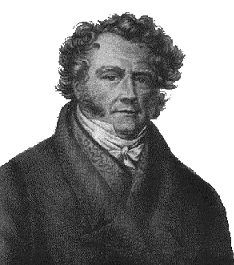
Lacenaire was an admirer of the semi-legendary Eugène François Vidocq, who had resigned a few years previously from his position as head of the Sûreté [1]. But while most saw the tale of the criminal turned policeman as one of redemption, Lacenaire saw it as one of wasted opportunity. Vidocq had spent three months in prison for assaulting a man his girlfriend had cheated on him with, but then been sentenced to a further eight for forging a pardon for another inmate (a charge which he always denied). He had escaped from prison, and eventually been pardoned by the king, but it was his account of his time in jail that intrigued Lacenaire. For he spoke in his memoirs of prison as a university of crime, and as the source of all the knowledge he would later use to his advantage in the police force. So, in order to prepare himself for life as a master criminal Lacenaire set out to be arrested. He first stole a car, and then killed a man in a duel. He would later report that killing the other man gave him “no emotion”. In the end however he was not arrested for duelling but rather for “fleeing the scene”, which he was less than happy about. Still, his object was accomplished and in September 1829 he was condemned to a year in prison.
In prison he did indeed make the criminal acquaintances he hoped for. Jean-Francais Chardon (known as “la Tante”, or “Auntie”, a common nickname in France at the time for a homosexual), a middle-aged female impersonator and conman. Jules Baton, a man with an impressive array of contacts throughout the Parisian underworld. And Victor Avril, a carpenter turned criminal with a penchant for extreme violence. When his year had elapsed, however, he found himself immediately seized for desertion, and had to spend another month in the stockade. Finally free, he was all set to begin his great life of crime. This consisted of failing to rob someone leaving the Royal Palace, and then immediately being arrested for trying to steal cutlery from a restaurant. Not exactly the height of crime. Convicted again, this time under a false name, he spent thirteen months in jail. During this stretch he made the acquaintance of a group of Republican activists, and while in prison he had several poems published anonymously in their anti-establishment newsletters. Once released, he met up with Victor Avril, and the two concocted a plot to kill Chardon, their former cellmate. Chardon was rumoured to have made a lot of money through imitating a priest and selling fake religious artifacts. The two planned to murder him and take the money for themselves. [2] On a cold December morning, they knocked on Chardon’s door, and when he answered they rushed in and killed him, Lacenaire stabbing him with a dagger and Avril finishing him off with a hatchet. On discovering Chardon’s bedridden mother was also in the house, they turned over her mattress to check for valuables and then suffocated her with it. The rumours of Chardon’s wealth turned out to be just that, and their total haul was less than seven hundred francs, but Lacenaire was ecstatic, declaring it “the perfect crime”.
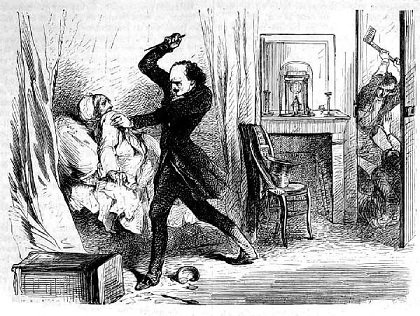
Two weeks later, Lacenaire struck again. On several previous occasions, he had tried to trick banks into delivering cash (which was usual at the time), and this time, with the aid of a forged cheque he managed it. A messenger delivered three thousand francs to the address Lacenaire had given him, and when he turned to leave an accomplice named Francois attacked him. The messenger escaped however, and was able to give the police a description of both his attacker and the man who had cashed the forged cheque. Lacenaire also made a mistake when he used the alias of Mahossier to cash the cheque, as this was also an alias used by Baton. When questioned by the police, he directed them to a former address of Lacenaire, and this gave him Lacenaire’s real name of Gaillard. Around this time, Avril was arrested on a different charge, and in order to gain leniency pointed the detective to to Lacenaire’s Parisien aunt – who had long since barricaded her door for fear her nephew would kill her. She gave him the name of Lacenaire, which was his preferred alias, and a detailed description. With this, Lacenaire was caught. At first he pleaded innocence, but Francois still paid off a group of prisoners to try to murder him to ensure his silence. When this was followed by the revelation that Avril had betrayed him he immediately confessed not only to the attack on the bank clerk but also to the murder of Chardon. The detective told him “You realise, of course, that this will finish you,” but he replied “I know that. It doesn’t matter so long as it finishes them as well.”
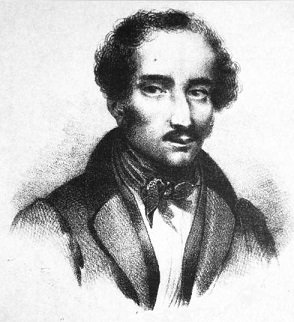
Modern biographers often believe that Lacenaire had a suppressed deathwish, and point to a childhood incident where his father took him to a guillotining and then told him that his own fate was to end the same way. His conduct at this point would certainly support that conclusion. The trial went down as one of the most famous in French history, as Lacenaire finally found his stage. His debonair appearance, elegantly expressed nihilism, and memorable pronouncements such as “I would kill a man as easily as I would drink a glass of wine”, all combined to make him an instant public favourite. The actual death sentence, inevitable after his confession, was almost an anticlimax. In the following days the condemned man became a bona fide celebrity, visited by scientists, writers and journalists. He completed his memoirs, and with them finally achieved the literary recognition he had craved. Through them, his self-serving philosophy of natural injustice justifying criminal action was spread far and wide. Still, though this was undoubtedly the highlight of his life, in the end it all came down to the cold morning of the 9th January, 1836. At 7am, Avril was executed for the murder of Chardon, and after him Lacenaire took his place on the scaffold. On the first drop of the blade it stuck, and so Lacenaire turned his head to look up, staring directly at the blade as it came down and took him from this world.
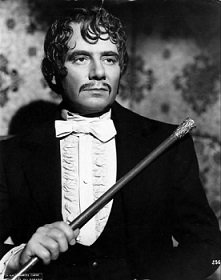
Lacenaire’s death did nothing to stem his celebrity – in fact, in death he achieved an apotheosis. The petty criminal and murderer of old women became the Elegant Criminal, the doomed antihero of a thousand stories. He was Valbayre, the noble bandit in Stendhal’s unfinished draft of Lamiel. He was Raskolnikov, the insane philosopher-murderer of Dostoyevsky’s Crime and Punishment. He was Montparnasse, the nattily-dressed killer from Les Miserables. He inspired an entire milieu of romantic and varied evil – but it must not be forgotten, all of this was based on his own account of himself, which was, as Weil would have agreed, more fiction than fact. He was a liar, a cheat, a murderer and a betrayer, who just as his father had predicted ended his days on the guillotine. The murder of Chardon and his mother was not some glorious act against the corrupt regime – it was the brutal killing of a middle aged man and an elderly woman, done for a handful of francs. Still, however, the legend of the Elegant Criminal has superseded that of the well-spoken thug who inspired him, with movies as recently as 1990 portraying him as the fascinating figure he was always convinced he was. There’s even a fancy Parisian clothing shop named after him. In the end, then, Lacenaire could be classed as the most successful criminal of all time – because he got exactly what he always wanted.
[1] The French plainclothes detective service, which had been created by Vidocq. It was the first such force in the world, and inspired police forces around the world to copy it.
[2] One persistent rumour is that a further reason for Lacenaire’s wish to do Chardon wrong was that while in prison the two had been romantic rivals over another man, Jules Baton. Though there is no definite evidence that Lacenaire was homosexual, there is no evidence that he was not, either. Against this is that Avril was openly contemptuous of Chardon’s sexuality and so would have been an unlikely accomplice for such a murder.
